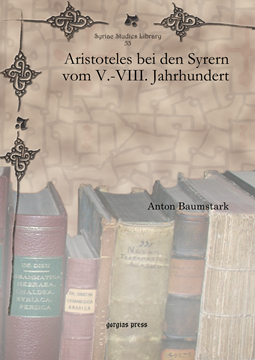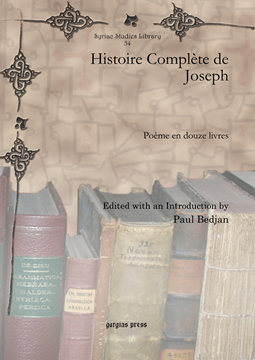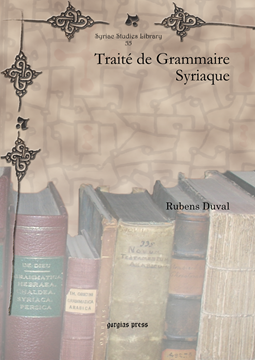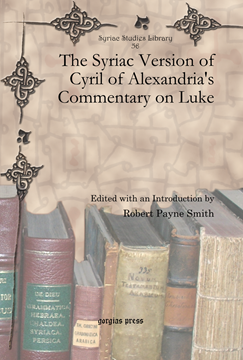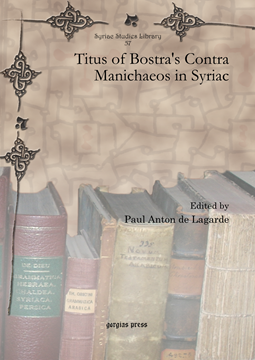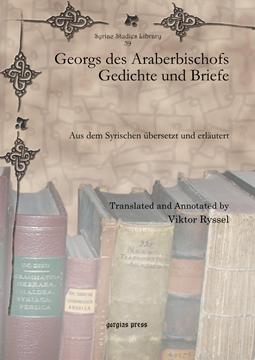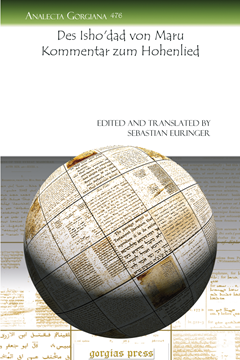Seine Person und sein Verständnis des Christentums
Ein Beitrag zur Geschichte der Kirche im Osten
By Paul Schwen
Series: Syriac Studies Library 52
ISBN: 978-1-60724-935-1
In this important study, still a standard resource on Aphrahat, Schwen deals with that writer’s life, works, and doctrine. It will be of certain use for students of Syriac literature and early Syriac Christianity.
$129.00 (USD)
Aristoteles bei den Syrern vom V.-VIII. Jahrhundert
Series: Syriac Studies Library 53
ISBN: 978-1-60724-936-8
In this volume, Baumstark deals with the transmission of Aristotelian philosophy into Syriac and Arabic. Syriac texts with German translations are included, alongside a detailed study of their textual interrelationships.
$172.00 (USD)
Histoire Complète de Joseph
Poème en douze livres
Edited with an Introduction by Paul Bedjan
Series: Syriac Studies Library 54
ISBN: 978-1-60724-937-5
Bedjan here presents the Syriac text, in vocalized East Syriac script, of a lengthy and highly praised poem (sometimes attributed to Ephrem, sometimes to Balai) on the Joseph story. An appendix contains a poem on the translation of Joseph’s bones.
$181.00 (USD)
Traité de Grammaire Syriaque
By Rubens Duval
Series: Syriac Studies Library 55
ISBN: 978-1-60724-938-2
Duval’s thorough Syriac grammar takes its place beside Nöldeke’s “compendious” grammar as a standard resource for every student and scholar of Syriac.
$205.00 (USD)
The Syriac Version of Cyril of Alexandria's Commentary on Luke
Edited with an Introduction by Robert Payne Smith
Series: Syriac Studies Library 56
ISBN: 978-1-60724-939-9
Payne Smith here gives an edition, prefaced by a helpful introduction (in Latin), of the Syriac translation of Cyril of Alexandria’s interpretation of Luke’s Gospel, which is incomplete in Greek.
$207.00 (USD)
Titus of Bostra's Contra Manichaeos in Syriac
Edited by Paul Anton de Lagarde
Series: Syriac Studies Library 57
ISBN: 978-1-60724-940-5
From an early manuscript dated to 411 Lagarde here produces the text of the Syriac version of Titus of Bostra’s (died 371) Against the Manichaeans, which has not survived complete in Greek.
$135.00 (USD)
The Pseudo-Clementine Recognitions and Homilies (10-14) in Syriac
Edited with an Introduction by Paul Anton de Lagarde
Series: Syriac Studies Library 58
ISBN: 978-1-60724-941-2
From two manuscripts, Lagarde has produced the text of the Syriac version of the Pseudo-Clementine Recognitions and Homilies (10-14). The Recognitions had also been translated into Latin, and Lagarde provides a concordance for the two translations.
$168.00 (USD)
Georgs des Araberbischofs Gedichte und Briefe
Aus dem Syrischen übersetzt und erläutert
Translated and Annotated by Viktor Ryssel
Series: Syriac Studies Library 59
ISBN: 978-1-60724-942-9
Ryssel here offers a German translation of a variety of works from George, Bishop of the Arabs (died 724). Included here are poems on monasticism and the chrism, and several letters dealing with a variety of topics, with commentary.
$151.00 (USD)
Le Livre d'Héraclide de Damas
Traduit en Francais
Translation and Introduction by François Nau
Series: Syriac Studies Library 60
ISBN: 978-1-60724-943-6
Nau gives here a heavily annotated French translation of the Syriac version of Nestorius’s lost Greek work called The Book of Heraclides, a lengthy defense and description of his christological position, along with a few shorter texts.
$196.00 (USD)
Des Isho'dad von Maru Kommentar zum Hohenlied
Edited and Translated by Sebastian Euringer
Series: Analecta Gorgiana 476
ISBN: 978-1-60724-944-3
Sebastian Euringer publishes here the Syriac text of Isho’dad of Merv’s commentary on the Song of Songs accompanied by an introduction, a German translation of the commentary, notes on the translation, and parallels from other commentaries.
$36.00 (USD)

